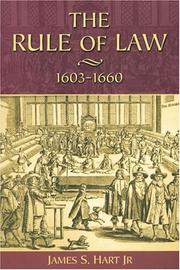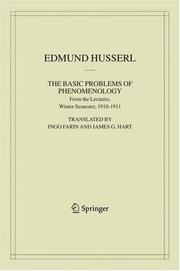| Listing 1 - 7 of 7 |
Sort by
|
Book
ISBN: 9048180856 140209177X 9786612236600 1282236601 1402091788 Year: 2009 Publisher: Dordrecht ; London : Springer,
Abstract | Keywords | Export | Availability | Bookmark
 Loading...
Loading...Choose an application
- Reference Manager
- EndNote
- RefWorks (Direct export to RefWorks)
If I am asked in the framework of Book 1, "Who are you?" I, in answering, might say "I don’t know who in the world I am." Nevertheless there is a sense in which I always know what "I" refers to and can never not know, even if I have become, e.g., amnesiac. Yet in Book 2, "Who are you?"has other senses of oneself in mind than the non-sortal "myself." For example, it might be the pragmatic context, as in a bureaucratic setting; but "Who are you? Or "Who am I?" might be more anguished and be rendered by "What sort of person are you" or "What sort am I?" Such a question often surfaces in the face of a "limit-situation," such as one’s death or in the wake of a shameful deed where we are compelled to find our "centers," what we also will call "Existenz." "Existenz" here refers to the center of the person. In the face of the limit-situation one is called upon to act unconditionally in the determination of oneself and one’s being in the world. In this Book 2 we discuss chiefly one’s normative personal-moral identity which stands in contrast to the transcendental I where one’s non-sortal unique identity is given from the start. This moral identity requires a unique self-determination and normative self-constitution which may be thought of with the help of the metaphor of "vocation." We will see that it has especial ties to one’s Existenz as well as to love. This Book 2 claims that the moral-personal ideal sense of who one is linked to the transcendental who through a notion of entelechy. The person strives to embody the I-ness that one both ineluctably is and which, however, points to who one is not yet and who one ought to be. The final two chapters tell a philosophical-theological likely story of a basic theme of Plotinus: We must learn to honor ourselves because of our honorable kinship and lineage "Yonder.".
Self (Philosophy). --- Philosophy --- Philosophy & Religion --- Existential phenomenology. --- Transcendentalism. --- Philosophy. --- Religion. --- Ethics. --- Religion --- Phenomenology. --- Philosophy of Religion. --- Religious Studies, general. --- Philosophy, Modern --- Idealism --- Existentialism --- Phenomenology --- Phenomenology . --- Religion, Primitive --- Atheism --- God --- Irreligion --- Religions --- Theology --- Mental philosophy --- Humanities --- Deontology --- Ethics, Primitive --- Ethology --- Moral philosophy --- Morality --- Morals --- Philosophy, Moral --- Science, Moral --- Values --- Religion—Philosophy. --- Moral Philosophy and Applied Ethics.
Book
ISBN: 1402087977 9786612127229 1282127225 1402087985 140209177X 9781402087974 9781402091773 Year: 2009 Publisher: Dordrecht ; London : Springer,
Abstract | Keywords | Export | Availability | Bookmark
 Loading...
Loading...Choose an application
- Reference Manager
- EndNote
- RefWorks (Direct export to RefWorks)
Both volumes of this work have as their central concern to sort out who one is from what one is. In this Book 1, the focus is on transcendental-phenomenological ontology. When we refer to ourselves we refer both non-ascriptively in regard to non-propertied as well as ascriptively in regard to propertied aspects of ourselves. The latter is the richness of our personal being; the former is the essentially elusive central concern of this Book 1: I can be aware of myself and refer to myself without it being necessary to think of any third-personal characteristic; indeed one may be aware of oneself without having to be aware of anything except oneself. This consideration opens the door to basic issues in phenomenological ontology, such as identity, individuation, and substance. In our knowledge and love of Others we find symmetry with the first-person self-knowledge, both in its non-ascriptive forms as well as in its property-ascribing forms. Love properly has for its referent the Other as present through but beyond her properties. Transcendental-phenomenological reflections move us to consider paradoxes of the "transcendental person." For example, we contend with the unpresentability in the transcendental first-person of our beginning or ending and the undeniable evidence for the beginning and ending of persons in our third-person experience. The basic distinction between oneself as non-sortal and as a person pervaded by properties serves as a hinge for reflecting on "the afterlife." This transcendental-phenomenological ontology of necessity deals with some themes of the philosophy of religion.
Self (Philosophy). --- Philosophy --- Philosophy & Religion --- Existential phenomenology. --- Transcendentalism. --- Philosophy. --- Epistemology. --- Metaphysics. --- Ontology. --- Philosophy of mind. --- Religion --- Phenomenology. --- Philosophy of Religion. --- Philosophy of Mind. --- Philosophy, Modern --- Idealism --- Existentialism --- Phenomenology

ISBN: 1138408115 1315843439 1317891864 9781317891864 9781315843438 9781317891864 0582238560 9780582238565 9781317891840 9781317891857 9781138408111 1317891856 Year: 2014 Publisher: Abingdon, Oxon : Routledge,
Abstract | Keywords | Export | Availability | Bookmark
 Loading...
Loading...Choose an application
- Reference Manager
- EndNote
- RefWorks (Direct export to RefWorks)
This book measures contemporary attitudes to the law - within and outside of the legal profession - to see how c17th century Englishmen defined the role of law in their society, to see what their expectations were of the law and how these expectations helped shape political debate - and ultimately determined political decisions - over the course of a very turbulent century.
Law --- Acts, Legislative --- Enactments, Legislative --- Laws (Statutes) --- Legislative acts --- Legislative enactments --- Jurisprudence --- Legislation --- History --- Social aspects

ISBN: 1402037872 9781402037870 1402037899 9781402037894 1280624493 9786610624492 1402037880 Year: 2006 Volume: 12 Publisher: Dordrecht, The Netherlands : Springer,
Abstract | Keywords | Export | Availability | Bookmark
 Loading...
Loading...Choose an application
- Reference Manager
- EndNote
- RefWorks (Direct export to RefWorks)
Observes that in his ""Nachlass"", Husserl probably refers to ""The Basic Problems of Phenomenology (1910-1911)"". This book reveals Husserl in a critical dialogue with himself. It states that the second part of the lectures was never written down, because at that time Husserl was busy writing the 1911 essay ""Philosophy as a Rigorous Science.""
Theory of knowledge --- Phenomenology --- Philosophy, Modern --- Phenomenology. --- Philosophy, Modern. --- Modern philosophy --- Husserl, Edmund, --- Addresses, essays, lectures --- Phenomenology . --- Philosophy of mind. --- Genetic epistemology. --- Ontology. --- Philosophy of Mind. --- Epistemology. --- Being --- Philosophy --- Metaphysics --- Necessity (Philosophy) --- Substance (Philosophy) --- Developmental psychology --- Knowledge, Theory of --- Mind, Philosophy of --- Mind, Theory of --- Theory of mind --- Cognitive science --- Philosophical anthropology --- Epistemology --- Psychology
Book
ISBN: 3030448428 303044841X Year: 2020 Publisher: Cham : Springer International Publishing : Imprint: Springer,
Abstract | Keywords | Export | Availability | Bookmark
 Loading...
Loading...Choose an application
- Reference Manager
- EndNote
- RefWorks (Direct export to RefWorks)
This book presents an introduction to the metaphysical philosophy of nature put forward by Hedwig Conrad-Martius (1888-1966). Providing a unique perspective on central issues in modern and contemporary theoretical biology and physics, it will be of interest to anyone studying the history of the phenomenological movement as well as religious cosmology. The philosophical basis for this cosmology is Conrad-Martius’ “realontology”—a phenomenological account of the essence of reality. His position centers on the revival of ancient metaphysical themes in new transformed guises, especially potentiality and entelechy. Nature’s status, as a self-actuation of world-constituting essence-entelechies, places Conrad-Martius at the heart of philosophical-theological discussions of e.g. the hermeneutical mandate of demythologization as well as the nature of evolution. Of special interest is his insistence on both nature’s self-actuating and evolving powers and a robust theory of creation. .
Phenomenology. --- Conrad-Martius, Hedwig, --- Philosophy, Modern --- Philosophy of nature. --- Cosmology. --- Philosophy of Nature. --- Astronomy --- Deism --- Metaphysics --- Nature --- Nature, Philosophy of --- Natural theology --- Philosophy
Book
ISBN: 0585057664 9780585057668 1438410220 Year: 1986 Publisher: Albany : State University of New York Press,
Abstract | Keywords | Export | Availability | Bookmark
 Loading...
Loading...Choose an application
- Reference Manager
- EndNote
- RefWorks (Direct export to RefWorks)
Book
ISBN: 1937783251 9781937783259 9781617493812 1617493813 Year: 2013 Publisher: Chicago London
Abstract | Keywords | Export | Availability | Bookmark
 Loading...
Loading...Choose an application
- Reference Manager
- EndNote
- RefWorks (Direct export to RefWorks)
Computer science --- Technology --- Applied science --- Arts, Useful --- Science, Applied --- Useful arts --- Science --- Industrial arts --- Material culture --- Informatics --- History. --- Research.
| Listing 1 - 7 of 7 |
Sort by
|

 Search
Search Feedback
Feedback About UniCat
About UniCat  Help
Help News
News